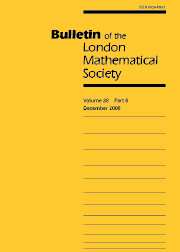No CrossRef data available.
Article contents
DAVID BERNARD SCOTT
Published online by Cambridge University Press: 01 September 1998
Abstract
Bernard Scott was born in London on 27 August 1915. At the time of his birth his name was Schultz. He was the only son of a Jewish family of fur and skin merchants who lived in North London; he had two sisters.
Bernard attended the City of London School from 1925 to 1934. From school records it appears that he evinced an early taste for argument and debate. There is also testimony of his enthusiasm for sport, especially rugby. His talents for mathematics and for chess became evident at an early stage. While mathematics became his profession, it was the game of chess that aroused in him an abiding passion and made him a first-class player throughout his life.
Bernard won an Open Scholarship in Mathematics to Magdalene College, Cambridge. He graduated with First Class Honours and a Distinction in Part III of the Mathematical Tripos in 1937. While pursuing his mathematical studies with evident success, he continued to cultivate his talent as a chess player. B. H. Neumann, who was a research student at Cambridge at that time, relates that he and Bernard Schultz (as he then was) went to London to take part in a weekend tournament and returned with all the prize money between them (about £7).
- Type
- OBITUARY
- Information
- Copyright
- © The London Mathematical Society 1998




